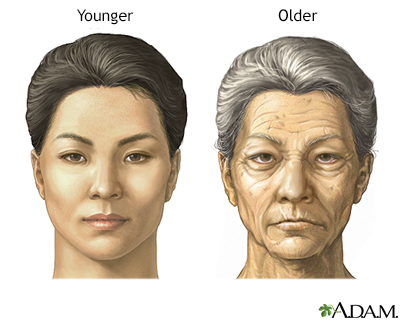Changes in face with age

Changes in face with age
With aging, the outer skin layer (epidermis) thins even though the number of cell layers remains unchanged. The number of pigment-containing cells (melanocytes) decreases, but the remaining melanocytes increase in size. Aging skin thus appears thinner, more translucent. Age spots or liver spots may appear in sun-exposed areas. Changes in the connective tissue reduce the skin's strength and elasticity. This is known as elastosis and is especially pronounced in sun-exposed areas.
Reviewed By
Ramin Fathi, MD, FAAD, Director, Phoenix Surgical Dermatology Group, Phoenix, AZ. Also reviewed by David C. Dugdale, MD, Medical Director, Brenda Conaway, Editorial Director, and the A.D.A.M. Editorial team.
 All rights reserved.
All rights reserved.